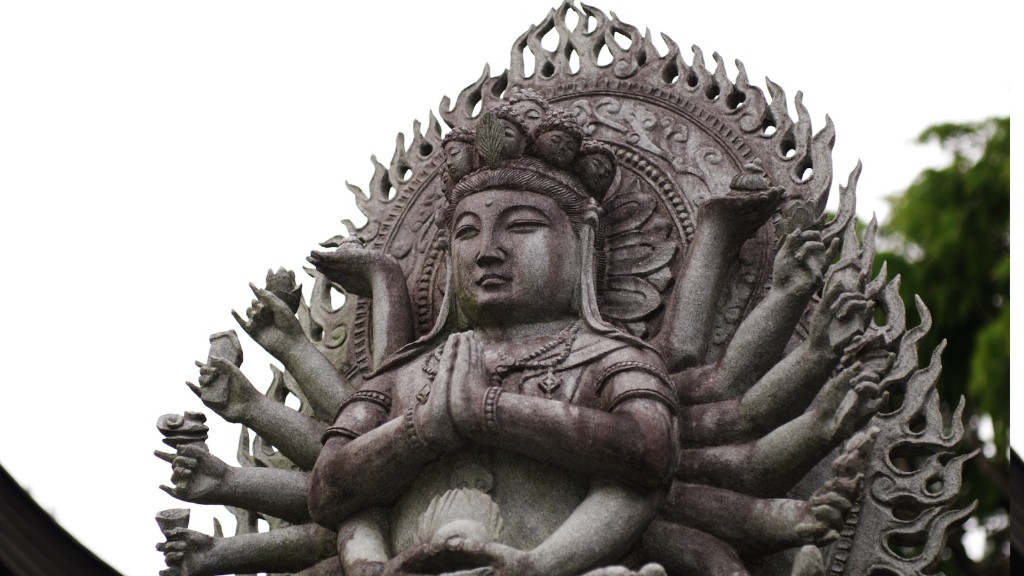Similarities between Buddhism and Hinduism
Buddhism and Hinduism are both ancient religions with a rich history and culture. These two religions have a lot in common and have been linked to each other since ancient times. Although they have different perspectives, they both share a common understanding of karma, reincarnation, and the cycle of life and death. They also share many beliefs, rituals and customs, such as meditation, vegetarianism, and respect for nature.
The most prominent commonality between Buddhism and Hinduism is their shared belief in karma and reincarnation. Karma refers to how our actions in this life will determine our fate in the next life. Hindus believe that humans have an obligation to break out of the cycle of karma and reincarnation, while Buddhists believe that there are certain ways to achieve liberation from the cycle.
Another important commonality is the concept of meditation. Both Buddhism and Hinduism promote the practice of meditation, although in different forms. For example, Buddhists focus their meditation on achieving enlightenment, while Hindus have various forms of meditation for a variety of purposes, such as to find inner peace or to connect with the Divine.
Both Buddhism and Hinduism also heavily respect the environment. They both promote the idea that we should respect and protect the environment and refrain from polluting or destroying it. For example, both religions advocate plant-based diets and discourage the killing of animals for food. They also both believe in the power of sacred spaces and nature’s healing properties.
Finally, Buddhism and Hinduism share the belief of non-attachment. This means that we must accept that everything in life is temporary, including our own lives. According to Buddhists and Hindus, we should release the bonds of attachment, renounce material desires, and focus on understanding the world. This is the path to achieving spiritual enlightenment.
Hinduism and Buddhism Teachings
Buddhism and Hinduism have various teachings that have been passed down for centuries. Both religions focus on a wide range of ethical and spiritual teachings. For example, Buddhism teaches that one should practice compassion, kindness, and self-discipline. Hinduism emphasizes detachment, devotion to God, and the practice of yoga. While Buddhism and Hinduism have many teachings in common, they also differ in some aspects. For instance, Buddhists believe in the Four Noble Truths, while Hindus believe in the three laws of materialism.
Buddhism and Hinduism have various paths to enlightenment. Buddhists have the Eightfold Path, which is composed of eight elements that must be followed in order to achieve buddhahood. Hindus have various paths to enlightenment, such as the path of knowledge, path of devotion, or path of yoga.
Both religions also have principles and share common texts, such as the Upanishads and the Bhagavad Gita in Hinduism and the Buddha’s Four Noble Truths in Buddhism. While these texts may have different interpretations, they both fundamentally stress the importance of living a life of ethical discipline and right thinking.
At the same time, both Buddhism and Hinduism have various sects and schools of thought. While some sects are more traditional and focus on religious ritualism, others are more modern and focus on gaining spiritual knowledge.
How Buddhists and Hindus Practice
Although there are many similarities between Buddhism and Hinduism, they differ in terms of how they practice. Buddhists focus more on meditation and the search for enlightenment while Hindus may focus more on the daily practice of devotional activities such as prayer and worship.
Buddhism and Hinduism also have different practices for achieving liberation. In Hinduism, liberation is achieved through asceticism and ritualistic worship, while in Buddhism liberation is achieved through meditation, self-discipline, and knowledge.
Additionally, there are also various rites and rituals that are practiced in both religions, such as offering incense, chanting mantras, or creating an altar. While some of these ceremonies are similar, such as offering incense, others may differ, such as chanting mantras.
Finally, in both Buddhism and Hinduism, religious practices can vary depending on the region and culture. While some practices may be similar, others may be quite different. For example, in some countries, Hindus and Buddhists may choose to observe their respective religious holidays, while in others there may be no such observance at all.
History of Buddhism and Hinduism
The origins of Buddhism and Hinduism date back over 2,500 years. Buddhism was founded by Siddhartha Gautama, who later became known as the Buddha, in India and Nepal. Hinduism is a much older religion, having its origins in the ancient Vedic culture. Both religions developed and evolved over the centuries, spreading to many different parts of the world.
Through the ages, Buddhism and Hinduism have had many interactions and exchanges of ideas. For example, the belief in karma and reincarnation is shared by both religions. Similarly, many Hindu practices, such as yoga and meditation, were adapted by Buddhists in the effort to reach enlightenment.
However, while Buddhism and Hinduism have had many interactions, they still remain distinct from each other in terms of their beliefs, rituals and practices. Buddhism, for instance, is a non-theistic religion in which the goal is to achieve enlightenment and attain nirvana, while Hinduism is a polytheistic religion that is based on the worship of various gods and goddesses.
Throughout history, Buddhism and Hinduism have spread to many parts of the world, influencing and changing the cultures in which they are practiced. They have also played a major role in developing societies and have given rise to philosophical and ethical systems that continue to be practiced today.
Conclusion
Buddhism and Hinduism are both ancient religions with a rich history and culture. Although they have different perspectives, they both share a common understanding of karma, reincarnation, and the cycle of life and death. Both religions have various teachings and paths to enlightenment, and they both emphasize the importance of self-discipline, compassion, and reverence for nature.Throughout history, Buddhism and Hinduism have spread to many parts of the world, influencing and changing the cultures in which they are practiced. While both Buddhism and Hinduism have many commonalities, it is important to recognize their individual beliefs and rituals.

